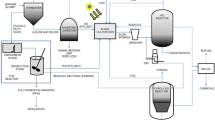Abstract
Agricultural wastes such as corn stover, straw and manure can be utilized to economically produce an animal feed supplement containing 25 to 33% protein. The process involves fermentation of the cellulose waste by the cellulolytic fungus, Chaetomium cellulolyticum, and manure can be used to supply the NPK requirements as well as the heat requirements. Results indicate that the process is economically attractive for a range of realistic scenarios involving a small number of farms located near a large feedlot. It is felt that improved technology will result in better economics.
Similar content being viewed by others
References
Moo-Young, M., Daugaulis, A.J., Chahal, D.S., and Macdonald, D.G. The Waterloo process for SCP production from waste biomass. Process Biochem., 14 no. 10, (1979).
Moo-Young, M., Macdonald, D.G., and Ling, A., New process changes pulpmill wastes to animal food. Pulp-Paper Can. 81, 125–129 (1980).
Moo-Young, M., Macdonald, D.G., and Ling, A., Sensitivity analysis of the Waterloo SCP process in agricultural waste treatment. Can. J. Ag. Eng., in press (December issue, 1980).
Author information
Authors and Affiliations
Rights and permissions
About this article
Cite this article
Moo-Young, M., Macdonald, D.G. & Ling, A. Improved economics of the Waterloo SCP process by increased growth rates. Biotechnol Lett 3, 149–152 (1981). https://doi.org/10.1007/BF00127368
Issue Date:
DOI: https://doi.org/10.1007/BF00127368




